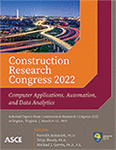Spatial Analysis on Routine Occupant Behavior Patterns and Associated Factors in Residential Buildings
Publication: Construction Research Congress 2022
ABSTRACT
Residents have full control over home systems and place a significant influence on energy consumption. Despite advanced building technologies and energy-efficient appliances, energy consumption in residential buildings remains high in the US and around the world. This can be explained by the interaction effects between building technology and occupant behavior. Given an increasing number of studies on occupant behavior, residents’ routine daily energy use activities remain unclear in the literature. The goal of this study is to identify the components that influence the similarity and differences of energy usage-related activities. To achieve the goal, this study aims to (1) compare the components of routine occupant behaviors using the US national behavior data by region, and (2) identify if geographical location affects the characteristics of activities using GIS. The findings inform that duration, start time, and end time have more influences on the differences in energy usage-related activities, and watching TV, washing and grooming, and cooking and food preparation are more different by geographical location. The result can be used to provide more reliable information regarding energy and behavior to the occupants in residential buildings. Also, the result can be applied to the new energy and behavior strategies and policies about residential building energy plans.
Get full access to this article
View all available purchase options and get full access to this chapter.
REFERENCES
Aksanli, B., Akyurek, A. S., and Rosing, T. S. (2016). “User behavior modeling for estimating residential energy consumption.” Smart City 360°, Springer, 348–361.
Diao, L., Sun, Y., Chen, Z., and Chen, J. (2017). “Modeling energy consumption in residential buildings: A bottom-up analysis based on occupant behavior pattern clustering and stochastic simulation.” Energy and Buildings.
ESRI. (2018). “Data classification methods.” ArcGIS Pro, <http://pro.arcgis.com/en/pro-app/help/mapping/layer-properties/data-classification-methods.htm>.
Fonseca, J. A., and Schlueter, A. (2015). “Integrated model for characterization of spatiotemporal building energy consumption patterns in neighborhoods and city districts.” Applied Energy, 142, 247–265.
Johnson, B. J., Starke, M. R., Abdelaziz, O. A., Jackson, R. K., and Tolbert, L. M. (2014). “A method for modeling household occupant behavior to simulate residential energy consumption.” Innovative Smart Grid Technologies Conference (ISGT), 2014 IEEE PES, IEEE, 1–5.
Kolter, J. Z., and Ferreira, J., Jr. (2011). A Large-Scale Study on Predicting and Contextualizing Building Energy Usage. AAAI.
Ma, J., and Cheng, J. C. (2016). “Estimation of the building energy use intensity in the urban scale by integrating GIS and big data technology.” Applied energy, 183, 182–192.
McCoy, A. P., Zhao, D., Ladipo, T., Agee, P., and Mo, Y. (2018). “Comparison of green home energy performance between simulation and observation: A case of Virginia, U.S.” Journal of Green Building, 13(3), 70–88.
Mo, Y. (2018). Occupant Behavior Prediction Model Based on Energy Consumption Using Machine Learning Approaches. Doctoral Dissertation, Michigan State University, East Lansing, MI.
Mo, Y., and Zhao, D. (2021). “Effective Factors for Residential Building Energy Modeling using Feature Engineering.” Journal of Building Engineering, 102891.
Mo, Y., Zhao, D., and Sorce, J. (2020). “Daily Occupant Behavior Pattern Affecting Energy Use in Residential Buildings.” Construction Research Congress 2020: Computer Applications, American Society of Civil Engineers Reston, VA, 518–526.
Mo, Y., Zhao, D., and Syal, M. (2019). “Effective Features to Predict Residential Energy Consumption Using Machine Learning.” Computing in Civil Engineering 2019: Smart Cities, Sustainability, and Resilience, American Society of Civil Engineers Reston, VA, 284–291.
Reinhart, C. F., and Davila, C. C. (2016). “Urban building energy modeling–A review of a nascent field.” Building and Environment, 97, 196–202.
Wilkinson, L., Engelman, L., Corter, J., and Coward, M. (2004). “Cluster Analysis.” Systat University of Illinois Urbana-Champaign, 65–124.
Witten, I. H., Frank, E., Hall, M. A., and Pal, C. J. (2016). Data Mining: Practical machine learning tools and techniques, Morgan Kaufmann.
Zhao, D., McCoy, A. P., Du, J., Agee, P., and Lu, Y. (2017). “Interaction effects of building technology and resident behavior on energy consumption in residential buildings.” Energy and Buildings, 134, 223–233.
Zhao, D., McCoy, A. P., and Smoke, J. (2015). “Resilient Built Environment: New Framework for Assessing the Residential Construction Market.” Journal of Architectural Engineering, B4015004.
Information & Authors
Information
Published In
History
Published online: Mar 7, 2022
Authors
Metrics & Citations
Metrics
Citations
Download citation
If you have the appropriate software installed, you can download article citation data to the citation manager of your choice. Simply select your manager software from the list below and click Download.
